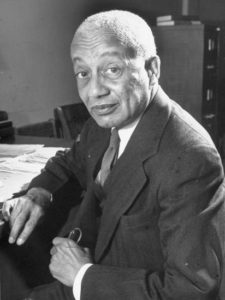From the Magazine: Humanist Profile: Alain Locke

“Art must discover and reveal the beauty which prejudice and caricature have overlaid.”
—Alain Locke
Alain LeRoy Locke was born on September 13, 1885, the only child of Pliny Ishmael Locke (the first black employee of the US Postal Service) and Mary Hawkins Locke, a teacher. He was the first ever African-American Rhodes Scholar and went on to earn a PhD in philosophy from Harvard University in 1918. He was named chair of the department of philosophy at Howard University soon after and taught philosophy at the University of Wisconsin and the New School for Social Research. He also served as Inter-American Exchange Professor in Haiti. Credited with founding the Harlem Renaissance (which marks its centennial this year), Locke wrote extensively on philosophy, race, cultural pluralism, arts, and literature.
Locke began as a pragmatist philosopher in the tradition of John Dewey and William James. He was a member of the Baha’i faith, but considered himself “universalist in religion” and philosophically to be “more of a humanist than a pragmatist.” Indeed, the Department of Philosophy at the University of Wisconsin was chaired by Max Otto, one of the earliest and most prominent scientific humanist philosophers. Another prominent humanist philosopher and longtime friend, Horace Kallen, invited Locke for a similar position at the New School. Further, the inclusion of Locke’s work in collections of essays edited by Otto, Kallen, and Sidney Hook (signatory to Humanist Manifesto II) is additional evidence of the humanist character of Locke’s philosophy.
Embracing his African heritage, he launched the Harlem Renaissance to document, preserve, and advance African-American culture. He not only wrote about the philosophy of African art and art in general, but promoted exhibitions and collections, both from Africa and of the African diaspora in the US. After being fired by Howard University in 1925 with a handful of other professors demanding equal pay with white professors, Locke focused on developing his notion of the “New Negro.” Unlike many other Harlem Renaissance figures, he championed African culture as equal to that of other world regions and celebrated both the folk and the urban culture of African Americans, challenging the white supremacist view of Africa as primitive. While they had their differences, he enjoyed extensive exchanges or friendships with Langston Hughes, W.E.B. DuBois, Claude McKay, and other leaders of African-American culture.
Locke returned to philosophy in the 1930s and engaged in adult education issues. He refined his views on race relations and his overall outlook, which he called “critical relativism.” He considered race and ethnicity as human constructs, similar to class distinctions. While Locke opposed excessive empiricism, he upheld African cultures as among the great human civilizations.
Locke engaged in the culture wars of his time. He attacked racism, color prejudice, discrimination against minorities, anti-Semitism, eugenics, and imperialism. While he was gay and mentored younger gay men, many of whom were artists, he did not seek to ease restrictions on homosexuality. He called for religious tolerance, yet confronted intolerance by religious leaders. He stressed the elements of basic unity necessary to democracy and peace. In the 1940s he advocated intercultural education, the roots of today’s multiculturalism. The currency of his work and prescience of his insight are perhaps best stated by the following quote from 1946:
To complete the building of democracy in America, there is another war to be won…. It is the struggle within the United States to establish all races and minorities as Americans, with equal rights, privileges, and obligations…. Unless this war for fuller democracy is won, fascism will always be a home-front threat, and America will not have made [its] proper contribution to lasting peace in the world.
Locke retired from Howard University in 1953 and moved to New York City. He died the following year after suffering complications from heart disease.
